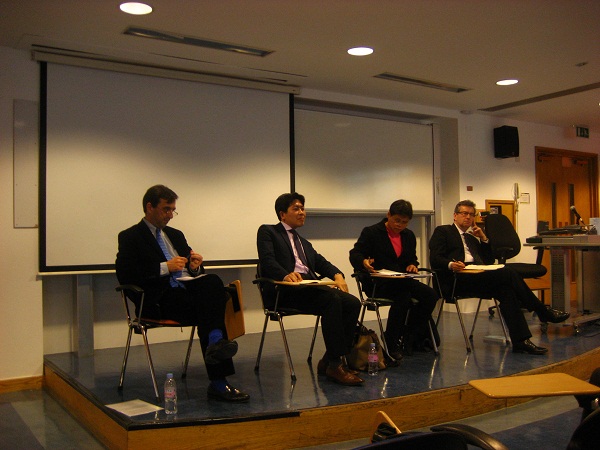 On 1 May 2012 the LSE’s European Foreign Policy Unit hosted the eighth of ten roundtables on ‘EU Foreign Policy after Lisbon’, entitled ‘The View from Asia’. The panellists were Professor Martin Holland (University of Canterbury, New Zealand), Dr Yeo Lay Hwee (EU Centre, Singapore), and Dr Michito Tsuruoka (National Institute for Defence Studies, Japan). The event was moderated by Dr Spyros Economides of the LSE.
On 1 May 2012 the LSE’s European Foreign Policy Unit hosted the eighth of ten roundtables on ‘EU Foreign Policy after Lisbon’, entitled ‘The View from Asia’. The panellists were Professor Martin Holland (University of Canterbury, New Zealand), Dr Yeo Lay Hwee (EU Centre, Singapore), and Dr Michito Tsuruoka (National Institute for Defence Studies, Japan). The event was moderated by Dr Spyros Economides of the LSE.
As the EU is entering what is widely expected to be the ‘Asian century’, policy-makers and academics alike need to reconsider the EU’s standing and role in international affairs. With Asia on the rise, the EU has to pay more attention to how it is perceived in that region. Three questions are crucial in this respect: Is the EU viewed as a coherent and effective foreign policy actor by countries in Asia? What kind of an actor is it perceived to be, e.g. a ‘normative power’ or a self-interested power? And what are the prospects for the development of relations between the EU and Asia in an emerging multipolar order?
A first realisation regarding the EU’s perception in Asia should be a sobering one for EU officials. It concerns the EU’s near invisibility in Asian media and public discourse. While the EU is a relevant actor for political elites, this assessment is uneven across states. For instance, while Chinese and Japanese politicians are more likely to consider the EU a ‘great power’, Indian and Singaporean officials are more sceptical. What most of them do agree on is a perception that the EU falls short of being a leader in international politics (only Japan identifies EU efforts on climate change as a leadership example).
Part of Asian uneasiness with how to view and approach the EU as a potential partner on the world stage rests in a fundamentally different conception of what constitutes the appropriate basis of a code of conduct between the partners. According to Yeo Lay Hwee, Asian countries place greater emphasis on strategic thinking and hard power potential in international relations. EU leaders may be surprised to find that the seemingly benevolent notion of ‘normative power’ resonates as condescension with Asian leaders. Further, it is not straightforward whether the EU should approach Asia as a region or rather in a bilateral fashion. In the past, its excessive focus on China prevented it from exploiting the full potential of its relationship with ASEAN.

EU-Asia relations have hardly ever been easy. Recently, however, the EU’s standing with Asian elites has become particularly strained. The present European debt crisis has cast a great shadow onto the EU’s ability to play a meaningful role on the world stage, and the common currency is increasingly becoming synonymous with a region in decline. The crisis has thus not just undermined the EU’s and European leaders’ credibility with their Asian partners but more lastingly incapacitated the appeal of the EU model of regional integration, which had gained popularity after the Asian financial crisis in 1997.
As the EU’s might in economic and financial affairs is crumbling, this also highlights the lack of other areas of cooperation. While Asia has grown accustomed to having the EU as a major trading partner, on political and security issues cooperation has been lacklustre. The question is: what can the EU offer to its counterparts in Asia? At present the answer seems to be: remarkably little. Apart from the unwillingness to grant Asian countries a greater role in international organisations such as the UN Security Council (see the blog entry for the roundtable on the EU and its strategic partners) the IMF or World Bank, European countries demonstrate little willingness to become engaged in, let alone choose sides in the various regional conflicts of Asia, such as the recent heightening of tensions over maritime security and various contested islands in the South China Sea, or more protracted issues such as Kashmir.
Interestingly, the EU’s lack of a strategic approach to Asia is glaringly obvious in its bilateral bond with Japan. The two actors have usually been framed in similar ways, such as a trading state or civilian power. The idea that they have shared values, often overlapping interests and the same level of economic development makes them straightforward partners in global affairs. Here, the EU’s normative power is seen to make it more conducive as a partner. However, rather than being a gatekeeper to Asia, Japan has figured comparatively low on the EU’s ‘strategic’ agenda. Michito Tsuruoka recalled former EU External Affairs Commissioner Chris Patten’s complaint that “the problem of EU-Japan relations is that there are no problems”. Paradoxically, this ‘easiness’ of relations seems to have impaired their depth. It was only with the EU’s lifting of the arms embargo on China that Japan realised that the EU may have a crucial role in its security interests – and this leaves the EU in a less favourable light in the eyes of Japan.
As an emerging multipolar global order is taking shape, a deepening of relations between the EU and Asia seems unavoidable. To a large extent it depends on Europe’s willingness to accommodate Asian ascendancy by integrating these countries into the established structure of international organisations – which so far is not being challenged by Asian countries. Change will find expression in a shift of significance from the G8 to the G20, for instance, and greater Asian representation in such organisations as the IMF and World Bank.
Moritz Reinsch
PhD candidate, European Institute, LSE



1 Comments